If you’re looking for the best stud finders to make your DIY projects safer and easier, I recommend checking out versatile models like the 5-in-1 wall scanners, advanced 6-in-1 devices, and high-precision sensors like Franklin’s ProSensor. These tools detect studs, wires, and pipes with quick, accurate results, often including safety features and easy calibration. If you want detailed insights on top options and how to choose the right one, keep exploring.
Key Takeaways
- Choose multi-sensor wall scanners with LCD displays for accurate detection of studs, pipes, and wires behind various wall types.
- Prioritize devices with easy calibration, visual/audible alerts, and safety features like live wire detection for safer DIY projects.
- Opt for lightweight, ergonomic models with versatile scan modes (stud, deep, metal) to improve efficiency and precision.
- Select reputable brands offering high accuracy, quick results, and additional features like laser levels or bubble levels for convenience.
- Consider compatibility with common wall materials (drywall, wood) and avoid models limited on concrete or brick for versatile home use.
Stud Finder Wall Scanner 5-in-1

If you’re a DIY enthusiast or homeowner looking for a versatile wall scanner, the Stud Finder Wall Scanner 5-in-1 is an excellent choice. I’ve found it reliable for detecting wood, metal, pipes, and joists behind drywall, floors, and ceilings. Its LCD display makes it easy to read, and calibration is straightforward, ensuring accurate results. Weighing just 7.8 ounces, it’s lightweight and easy to handle. While it works well on drywall and wooden surfaces, it isn’t suitable for concrete or brick walls. Overall, it’s a practical, budget-friendly tool that helps prevent wall damage during installation projects.
Best For: DIY homeowners and enthusiasts seeking an affordable, easy-to-use wall scanner for drywall and wooden surfaces to locate studs, pipes, and joists safely and efficiently.
Pros:
- Reliable detection of wood, metal, pipes, and joists behind drywall, floors, and ceilings
- Easy calibration and clear LCD display for straightforward use
- Lightweight design (7.8 ounces) enhances handling and maneuverability
Cons:
- Not suitable for use on concrete, brick, or block walls
- May require multiple scans or manual checks for accurate results
- Inconsistent readings reported by some users, affecting reliability
PREXISO 2-in-1 Stud Finder with Laser Level
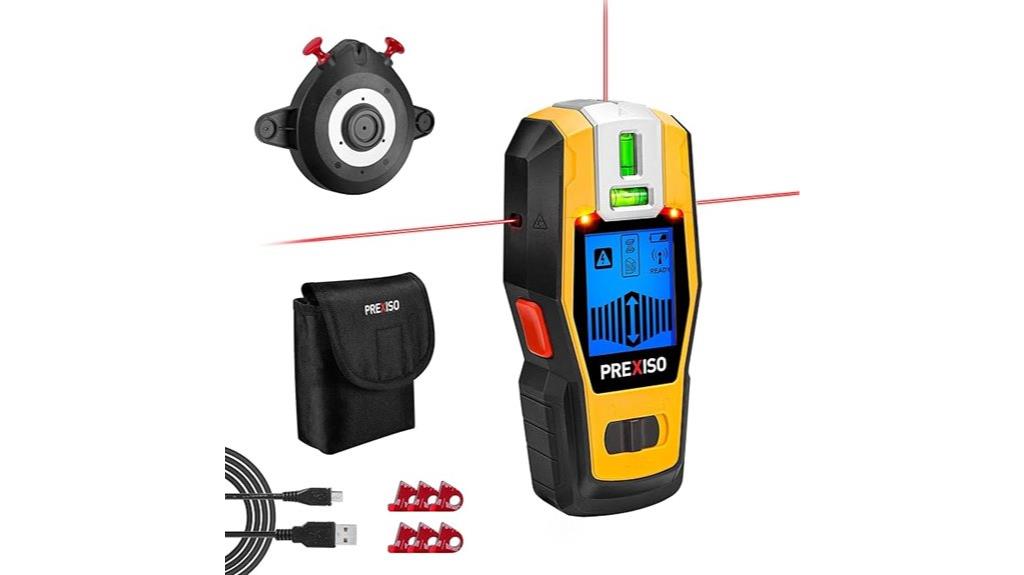
The PREXISO 2-in-1 Stud Finder with Laser Level is an excellent choice for anyone seeking a versatile tool that simplifies wall measurements and stud detection. It combines a rechargeable line laser with a stud finder, offering precise edge marking and easy leveling. The device detects wood and metal studs up to 3/4 inch deep and warns of live wires up to 1-1/2 inches away. Its multi-surface laser level provides both horizontal and cross-line references, even in dark areas. Compact and lightweight, it includes useful accessories like wall mounts and self-adhesive strips. Overall, it’s a reliable, all-in-one tool perfect for hanging, mounting, and renovation projects.
Best For: DIY enthusiasts, homeowners, and professionals seeking a versatile tool for accurate wall mounting, stud detection, and leveling in renovation and hanging projects.
Pros:
- Combines laser level and stud finder in one compact, rechargeable device for convenience.
- Accurate detection of wood and metal studs up to 3/4 inch deep and live wires up to 1-1/2 inches away.
- Includes useful accessories like wall mount, self-adhesive strips, and carrying storage bag for easy use and portability.
Cons:
- Calibration required before each use to ensure accuracy.
- Self-adhesive strips may not adhere well to dusty, coarse surfaces or wallpaper.
- Slightly higher price point compared to basic stud finders or laser levels without combined features.
Premium Wall Scanner Stud Finder for Wood, Metal, Wires, Pipes
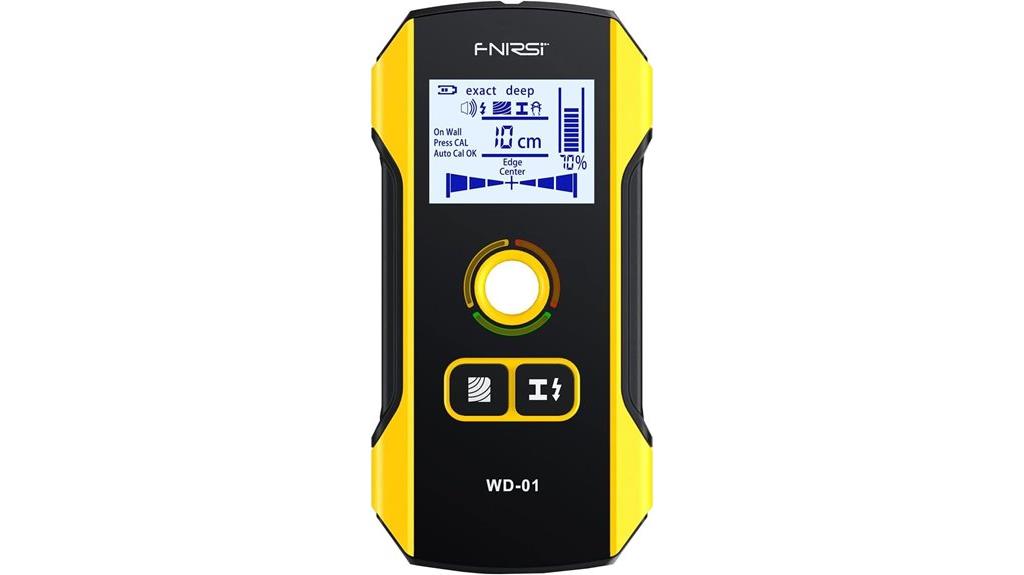
The Premium Wall Scanner Stud Finder is ideal for both professionals and homeowners who need reliable detection of multiple materials behind walls. It uses advanced 6-in-1 technology to accurately locate wood, metal studs, wires, pipes, and joists. Its compact, durable design makes it easy to handle in demanding environments. The clear LCD display provides real-time feedback, and visible holes help mark precise edges and centers. Safety features include alerts for live wires, preventing electrical hazards. While some users note occasional inaccuracies, overall, it offers impressive versatility and accuracy, making it a valuable tool for safe installation and renovation projects.
Best For: homeowners, DIY enthusiasts, and professionals seeking a versatile and reliable wall scanner for detecting studs, wires, and pipes behind various wall types.
Pros:
- Accurate 6-in-1 detection technology for multiple materials
- Compact, durable design suitable for demanding environments
- Clear LCD display with user-friendly interface and safety alerts
Cons:
- Occasional inaccuracies in detecting studs or wiring
- Learning curve due to extensive detection information and initial unfamiliarity
- Performance may vary depending on wall material, such as concrete or nails
PREXISO 2-in-1 Stud Finder with Laser Level
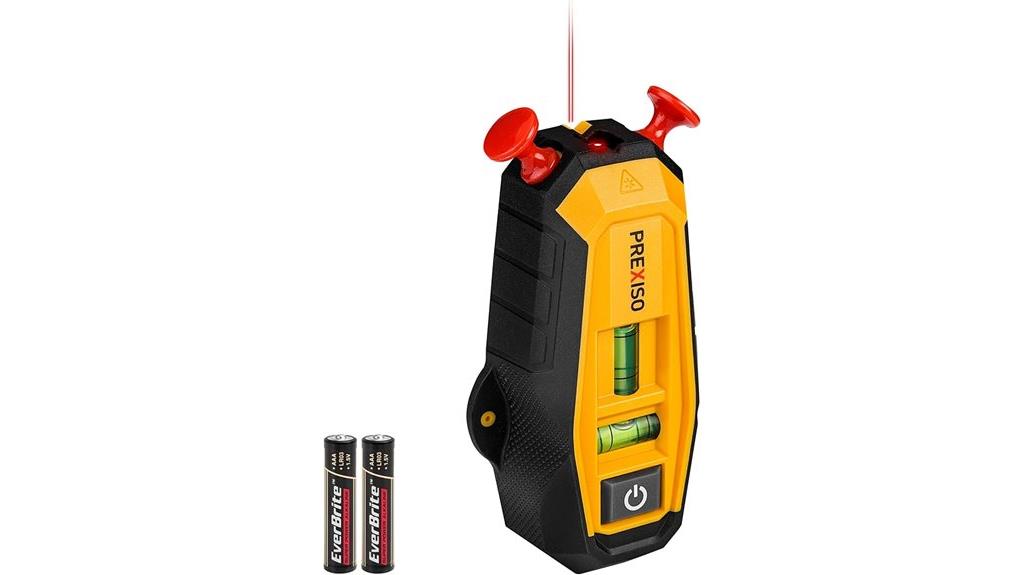
For anyone seeking a versatile and precise tool for wall tasks, the PREXISO 2-in-1 Stud Finder with Laser Level stands out. This compact device combines a line laser and wall scanner, making it easy to locate studs, nails, screws, and hidden metal inside walls. Its dual-function design includes red pins that attach securely to rough surfaces, freeing your hands for marking. The laser projects a vertical line up to 30 feet for accurate alignment, while built-in bubble vials ensure proper leveling. Made with shock-resistant rubber and lightweight, it’s perfect for hanging, mounting, or DIY projects, offering reliability and convenience in one tool.
Best For: DIY enthusiasts, homeowners, and professionals seeking a versatile, reliable tool for wall scanning, stud finding, and precise leveling in various indoor projects.
Pros:
- Combines line laser and wall scanner in one compact, easy-to-use device.
- No batteries needed for metal and stud detection, ensuring continuous operation.
- Built-in bubble vials and shock-resistant rubber enhance accuracy and durability.
Cons:
- Red pins are unsuitable for smooth, glossy surfaces like tiles.
- Laser projection may have limited visibility in extremely bright or outdoor conditions.
- The device’s size may be less suitable for detailed or intricate wall tasks requiring finer precision.
Franklin Sensors ProSensor M150/X990 Stud Finder
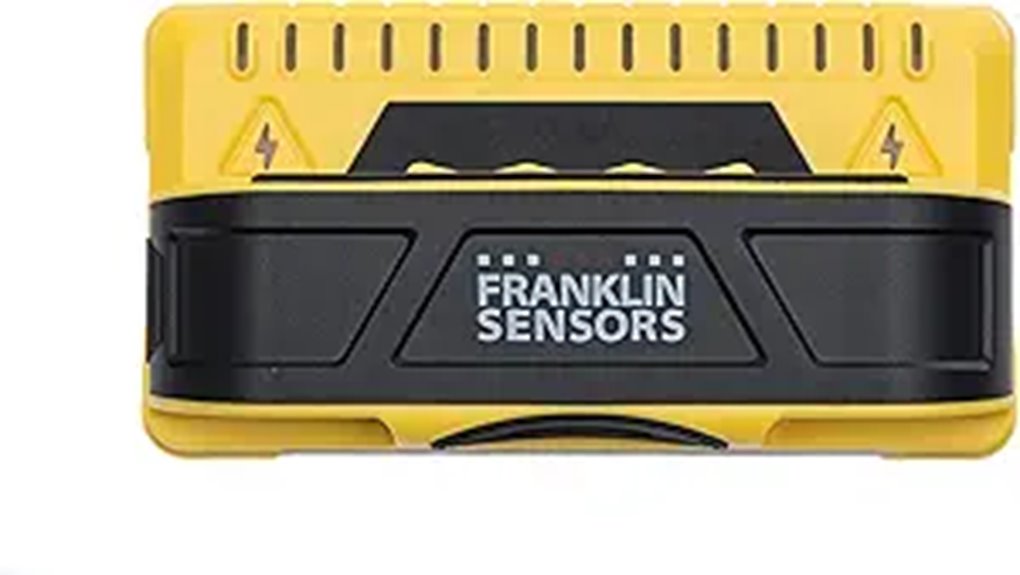
If you’re seeking a highly precise wall stud finder that can detect both wood and metal studs up to 1.5 inches deep, the Franklin Sensors ProSensor M150/X990 is an excellent choice. With 9 sensors, it offers unmatched accuracy, showing the exact center and edges of studs simultaneously via LED indicators. It works through drywall and thicker materials, including exterior walls, and detects electrical wiring for safety. No calibration is needed—just press and hold the button to scan. Lightweight at around 5.1 ounces, it’s easy to handle, reliable, and highly rated by both DIYers and professionals, making wall scanning safer and more efficient.
Best For: DIY enthusiasts and professionals seeking a highly accurate, easy-to-use stud finder for detecting wood and metal studs up to 1.5 inches deep through various wall types.
Pros:
- Highly accurate with 9 sensors providing precise center and edge detection of studs
- Detects both wood and metal studs, including electrical wiring for safety
- No calibration required; simple press-and-hold operation for quick results
Cons:
- Requires 2 AAA batteries (not included), which may be inconvenient for some users
- Slightly higher price point compared to basic stud finders
- Some users report minor inaccuracies on exterior walls or with stud spacing detection
Stud Finder Wall Scanner (5-in-1) with LCD Display

A 5-in-1 wall scanner with an LCD display stands out as an ideal choice for both professionals and DIY enthusiasts who need quick, accurate detection of studs, pipes, and live wires behind walls. Its microprocessor chip and HD LCD screen provide clear visuals of stud edges, centers, and detected materials, even in low light. Multiple scan modes—stud, deep, and metal—allow for all-encompassing wall analysis, enhancing safety and efficiency. Audible alerts and visual cues guide precise positioning, reducing guesswork. This versatile device saves time on projects like hanging shelves or mounting TVs, making it an essential tool for safe and effective wall work.
Best For: DIY homeowners, professional contractors, and safety-conscious individuals needing quick, accurate wall scanning for studs, pipes, and live wires.
Pros:
- Highly accurate and rapid detection with microprocessor chip and HD LCD display
- Multiple scan modes (stud, deep, metal) for comprehensive wall analysis
- Visual and auditory alerts for precise location guidance, even in low-light conditions
Cons:
- May require some familiarity to interpret LCD signals effectively
- Battery life could be limited with frequent use, necessitating replacements
- Slightly bulkier design compared to basic stud finders, which may affect maneuverability
Stud Finder Wall Scanner, 5-in-1 Multifunction Stud Locator
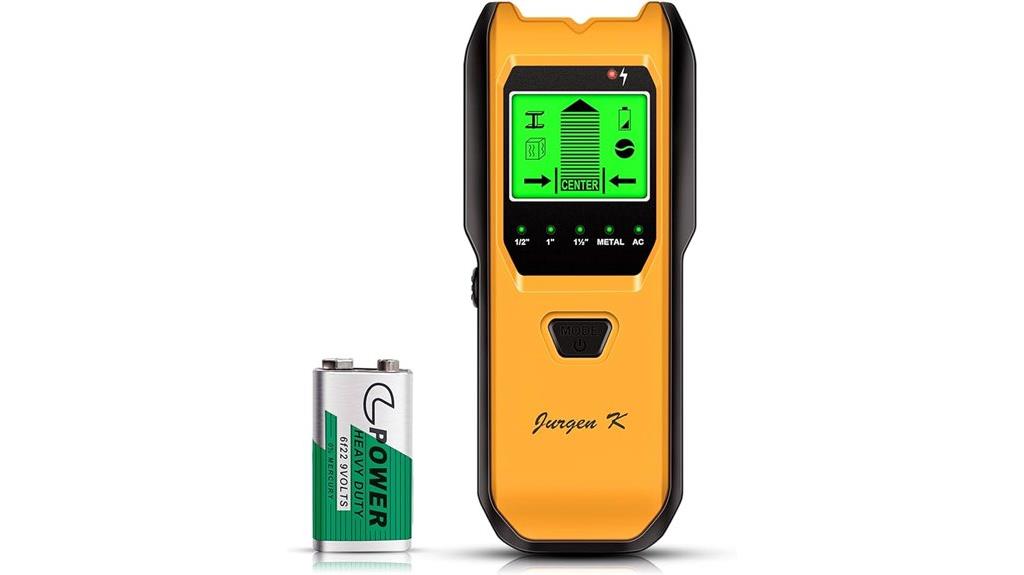
The Jurgen K Stud Finder Wall Scanner stands out as an ideal choice for homeowners and DIY enthusiasts who need a reliable, multifunction device for wall detections. This 5-in-1 scanner can accurately locate studs, metal, electrical wires, and pipes behind various surfaces, including wallpapered and painted walls. Its upgraded smart sensors, HD LCD display, and audio alarms make detection quick and precise. I appreciate its ergonomic design, lightweight build, and easy calibration process, which guarantees accurate results. Whether hanging shelves or remodeling, this scanner provides confidence and safety, outperforming basic models and offering versatile detection modes for a variety of projects.
Best For: DIY homeowners and professionals seeking a reliable, multifunction wall scanner for accurate detection of studs, wires, pipes, and metal behind various wall surfaces.
Pros:
- Versatile 5-in-1 detection modes for studs, metal, wires, and pipes
- Easy calibration and user-friendly interface with HD LCD display and audio alerts
- Compact, ergonomic design with lightweight construction for comfortable handling
Cons:
- Some users experience false positives or detection inaccuracies, especially with metal objects
- Wire detection mode may not work effectively in all home environments
- Slightly bulkier than other models, which may affect maneuverability for some users
CRAFTSMAN Stud Finder, 3/4-Inch Depth (CMHT77633)

CRAFTSMAN Stud Finder, 3/4-Inch Depth (CMHT77633) stands out as an ideal choice for DIY enthusiasts and homeowners seeking a reliable, easy-to-use tool for basic wall-hanging tasks. It detects studs up to ¾ inch deep on drywall, wallpaper, or fabric-covered surfaces, accurately locating edges and centers of wood or metal studs, including energized wires. Compact and durable, it’s lightweight at just 3.2 ounces, with a shock- and water-resistant body for long-term use. Simply press against the wall, and LED indicators reveal stud positions, making it perfect for hanging shelves, pictures, or fixtures with confidence and minimal fuss.
Best For: DIY homeowners and casual users seeking an affordable, easy-to-use stud finder for light to moderate wall-hanging projects.
Pros:
- Simple operation with clear LED indicators for quick stud detection
- Lightweight and durable design ideal for extended use and handling
- Detects both wood and metal studs, including energized wires, on various surfaces
Cons:
- May require multiple passes for accurate detection on certain wall surfaces
- Occasional false positives or inaccuracies reported by some users
- Not suitable for professional-grade or highly precise wall measurements
Franklin Sensors ProSensor M210 Stud Finder with 13 Sensors

If you’re seeking a highly accurate and reliable stud finder that simplifies wall scanning, the Franklin Sensors ProSensor M210 with 13 sensors is an excellent choice. It uses patented sensors to detect studs with remarkable precision, showing both the center and edges simultaneously via a wide LED display. It automatically adjusts for depth up to 1.7 inches and includes a live wire meter for electrical safety. Its built-in bubble level and compact design make alignment and handling easy. Rated highly for accuracy and durability, the M210 is trusted by both DIYers and professionals for quick, confident wall measurements and safe drilling.
Best For: DIY enthusiasts and professionals seeking a highly accurate, easy-to-use stud finder for quick, safe wall measurements and electrical detection.
Pros:
- Utilizes 13 patented sensors for superior accuracy in detecting studs and edges
- Displays both the center and edges of studs simultaneously via a wide LED screen for full-width visualization
- Includes a live wire meter and built-in bubble level for safety and precise alignment
Cons:
- Requires 2 AA batteries not included, and performance depends on high-quality, fully charged batteries
- Battery compartment cover can be cumbersome and may loosen over time
- Slightly larger and heavier than basic models, which may affect handling for some users
Stud Finder Wall Scanner 5-in-1

Looking for a versatile wall scanner that can detect multiple materials with high precision? The Stud Finder Wall Scanner 5-in-1 is an excellent choice. It uses an upgraded intelligent chip and micro-sensor technology to accurately locate wood, metal, pipes, joists, and live AC wires. With multiple scanning modes—stud, AC, and metal—it adapts to different tasks and wall depths. The device features a high-definition LCD display, audible alerts, and safety indicators for live wires, making operation straightforward. Its automatic calibration guarantees reliable results, and its ergonomic design makes it comfortable to handle. Overall, it offers a reliable, user-friendly solution for safe and efficient wall scanning.
Best For: DIY enthusiasts, homeowners, and professionals seeking a versatile, high-precision wall scanner for safe and efficient installation projects.
Pros:
- Detects multiple materials (wood, metal, pipes, AC wires) with high accuracy using upgraded technology.
- Features a clear high-definition LCD display, audible alerts, and safety indicators for ease of use.
- Automatic calibration ensures reliable results across different wall types and conditions.
Cons:
- Some users report inconsistent detection results, especially with metal and cross-stud identification.
- Proper calibration is essential; repeated calibration may be needed if readings fluctuate.
- Detection depth and sensitivity can vary depending on wall material and thickness.
PREXISO 5-in-1 Stud Finder with Laser Level and Ultrasound Distance Measure

The PREXISO 5-in-1 Stud Finder with Laser Level and Ultrasound Distance Measure stands out as a versatile tool for anyone tackling home improvement or repair projects. It offers five detection modes, including locating wood studs, metal pipes, live wires, and measuring distances and areas with ultrasound and laser marking. Its digital LCD display, sound alerts, and pencil pointer make locating and marking objects straightforward. With automatic calibration and decent depth detection—up to 1 inch for studs and 1-1/2 inches for metal—it’s reliable on dry surfaces. Ergonomically designed, it’s perfect for precise installations on walls, floors, and ceilings, making DIY tasks safer and more efficient.
Best For: DIY enthusiasts and homeowners seeking a versatile, easy-to-use tool for wall, floor, and ceiling inspections during installations or repairs.
Pros:
- Combines five detection modes including studs, metal pipes, live wires, ultrasound, and laser marking for comprehensive use
- Automatic calibration and visual/audio alerts improve accuracy and ease of use
- Ergonomic design with a digital LCD display and pencil pointer simplifies locating and marking objects
Cons:
- Ultrasound distance measurement is rough and not highly precise
- Effectiveness may be compromised on moist or metallic surfaces, leading to false readings
- Auxiliary laser marking is not suitable for stone, metal, or low-density plasterboard surfaces
StudPoP Original Magnetic Stud Finder with Visual & Audible Indicators

For homeowners and DIY enthusiasts dealing with older or complex walls, the StudPoP Original Magnetic Stud Finder stands out as an ideal choice. It’s simple to use—no batteries or calibration needed—and highly reliable. Its 1-inch moving magnet provides clear visual movement and an audible click when it detects nails or screws, making locating studs quick and accurate. It works well on challenging surfaces like lath, plaster, tile, and thick walls, especially in older homes. With durable construction and no need for adjustments, it’s a cost-effective tool that’s praised for its effectiveness and ease of use, earning high customer ratings.
Best For: homeowners, DIY enthusiasts, and professionals working on older or complex walls who need a reliable, battery-free stud finder that works on challenging surfaces.
Pros:
- No batteries or calibration required, making it simple and maintenance-free.
- Highly sensitive magnetic detection, effective on various wall types including thick and uneven surfaces.
- Easy to use with clear visual and audible indicators, providing quick and accurate results.
Cons:
- Requires slow, careful movement for optimal detection, which may take extra time.
- Magnetic field could pose risks to pacemaker wearers; caution needed.
- Slightly more expensive than some electronic alternatives, though valued for durability and reliability.
Stud Finder Wall Scanner 5-in-1 with LCD Display

If you need a reliable tool to locate studs, pipes, and live wires quickly and accurately, the Stud Finder Wall Scanner 5-in-1 with LCD Display is an excellent choice. It detects wood, metal, AC wiring, and pipes in seconds, thanks to its upgraded sensor chip that boosts sensitivity. The device features a clear HD LCD, audio alarms, and edge/center detection for precise positioning. Its five scanning modes—stud, metal, wire, and depth gauge—make it versatile for various projects. Lightweight and durable, it’s suitable for hanging, renovations, or remodeling, helping you avoid accidents and reduce wall damage. It’s a practical, efficient tool for any DIYer or professional.
Best For: DIY homeowners and professional renovators needing quick, accurate detection of studs, pipes, and wires for safe and efficient wall installations.
Pros:
- Highly sensitive with upgraded chip for precise detection of wood, metal, and live wires up to 2 inches deep
- Versatile with 5 scanning modes including stud, metal, wire, and depth gauge for various applications
- Durable, lightweight design with HD LCD display and audio alarms for easy operation and long-term use
Cons:
- Requires 9V battery (not included), which may be inconvenient to purchase separately
- Calibration process can be affected by moisture or recent wall coatings, potentially impacting accuracy
- Slightly larger size may be cumbersome for very tight or detailed work in confined spaces
Stud Finder Wall Scanner, 6-in-1 Wall Stud Finder Tool

A versatile tool like the Stud Finder Wall Scanner 6-in-1 is ideal for both DIYers and professionals who need reliable wall detection. Its gear-shaped body makes marking easy, while the HD LCD screen provides clear, instant results. Weighing just 8.4 ounces and designed ergonomically, it’s comfortable to hold and use for extended periods. The device offers multiple detection modes: stud, metal, and AC live wire detection, with adjustable depths for precise locating. Its vibrant Tangerine color ensures visibility, and the durable mix of plastic and metal guarantees longevity. Powered by batteries (included), it’s portable, intuitive, and a smart addition to any toolkit, enhancing safety and accuracy during wall projects.
Best For: DIY enthusiasts and professionals seeking a reliable, multi-function wall scanner for safe and precise home improvement projects.
Pros:
- Versatile 6-in-1 detection modes including stud, metal, and live wire detection for comprehensive wall scanning.
- Ergonomic design with a gear-shaped body and HD LCD screen for easy marking and clear results.
- Compact, lightweight (8.4 ounces) and portable, making it comfortable for extended use and easy to handle.
Cons:
- Battery life may decrease with extended use, requiring frequent replacements or recharging.
- Accuracy can be affected by wall insulation thickness and electrical voltage, which may require calibration adjustments.
- Limited maximum detection depths for metal and wires might not suit very thick walls or specialized materials.
DEWALT Stud Finder, 3/4
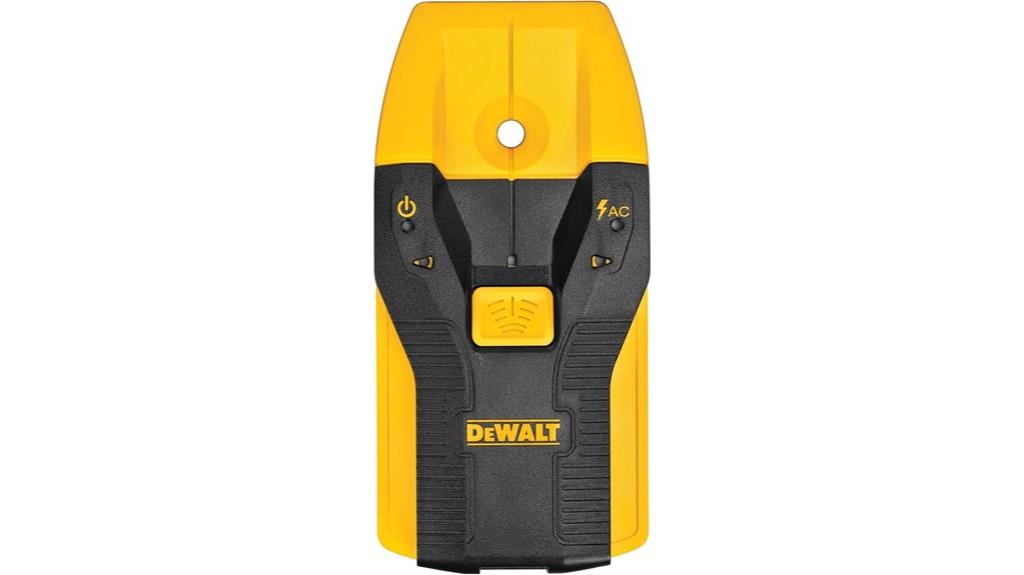
The DEWALT DW0100 Stud Finder stands out with its center-find technology, making it an excellent choice for anyone seeking precise stud detection in drywall and similar materials. It can locate framing studs up to 3/4 inch deep in wood and metal, with LED arrows and audible alerts that clearly mark the stud’s center. Its auto-calibration guarantees consistent accuracy, while its slim, lightweight design makes it easy to maneuver in tight spaces. Rated IP65, it’s protected against dust and moisture, boosting durability. Users appreciate its quick, reliable detection, though some note occasional false positives. Overall, it’s a dependable, user-friendly tool suitable for home projects and DIYers.
Best For: DIY homeowners and casual users seeking quick, accurate stud detection in drywall and light construction projects.
Pros:
- Precise center-find technology with clear LED and audible alerts
- Slim, lightweight design for easy handling in tight spaces
- Durable IP65 rating offers protection against dust and moisture
Cons:
- May produce false positives or inconsistent readings on textured or uneven walls
- Sensitivity can be affected by wall thickness and material variations
- Occasional difficulty in locating studs in complex or heavily textured surfaces
Factors to Consider When Choosing Stud Finders for Walls
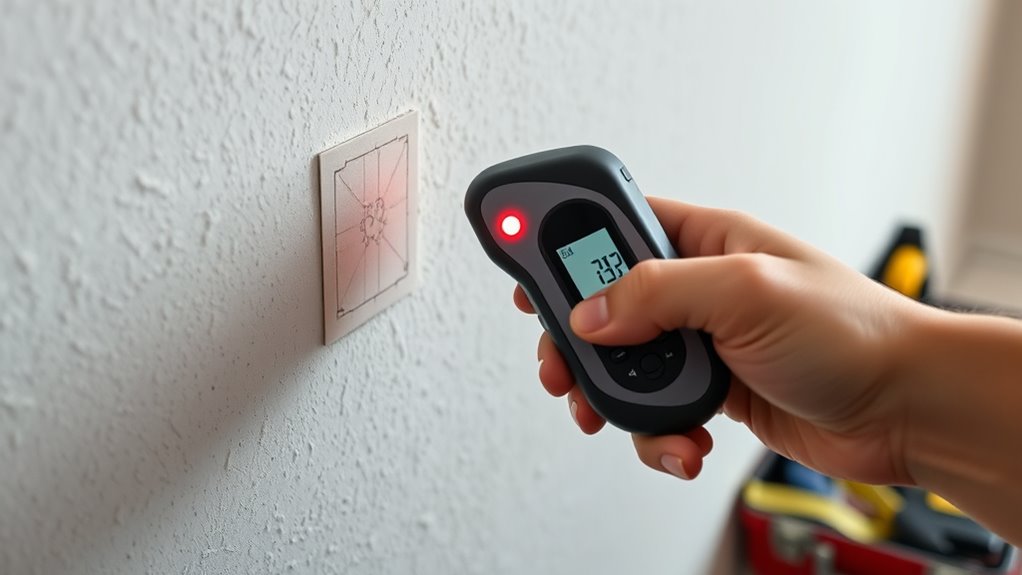
When selecting a stud finder, I consider how well it works with different wall materials and its detection depth. I also look for easy calibration, accuracy standards, and safety features to guarantee reliable and safe use. These factors help me choose a tool that’s effective and suited to my specific needs.
Wall Material Compatibility
Choosing the right stud finder depends heavily on the wall material you’re working with because different surfaces present unique detection challenges. For instance, magnetic stud finders work well on thick or uneven surfaces like plaster and brick since they detect metal fasteners directly. Electronic stud finders are typically better suited for drywall and wooden walls, but they may struggle with dense materials such as concrete or brick. Some advanced models feature multi-surface sensors, allowing them to adapt to various wall types and improve accuracy. Keep in mind that calibration and detection depth vary with wall composition; thicker or denser walls often require stud finders with higher detection capabilities. Matching your tool to your wall material ensures safer, more reliable results for your DIY projects.
Detection Depth Range
Understanding the detection depth range of a stud finder helps guarantee you pick the right tool for your wall type. This range indicates how deep the device can locate studs, pipes, or wires behind your wall, usually measured in inches or millimeters. Different wall materials, like drywall, plaster, or brick, impact how well a stud finder works at certain depths. Many electronic models detect studs from about 1/2 inch to 2 inches deep, with advanced options reaching 3 inches or more. For thicker or denser walls, such as brick or concrete, you’ll need a tool with a higher detection capacity. Ensuring the depth range exceeds your wall’s thickness helps you reliably find studs and utilities without misses or false readings.
Ease of Calibration
A stud finder that’s easy to calibrate can save you time and frustration during setup. Devices with minimal calibration steps or automatic calibration make the process quick and straightforward, helping guarantee consistent, reliable readings. Proper calibration involves placing the device flat against the wall and following simple instructions, which reduces errors like missed studs or false positives. Complex calibration procedures or unclear instructions can lead to mistakes and unreliable results, making your project more difficult. Choosing a stud finder with clear, simple calibration steps allows you to get accurate results faster, especially if you’re new to wall scanning. Overall, an easy-to-calibrate device makes the entire process smoother, giving you confidence that you’re detecting studs correctly without wasting time or risking mistakes.
Detection Accuracy Standards
Detection accuracy is a key factor when selecting a stud finder because it determines how reliably the device can identify studs and hidden utilities. Most standards require at least 90% correct identification within specific depths, ensuring dependable performance. High-accuracy models often use multiple sensors—six or more—to enhance precision and minimize false positives or negatives. Proper calibration is essential; accurate devices demand consistent procedures to maintain reliability across different wall types and conditions. Keep in mind, wall material, thickness, and surface conditions can influence accuracy, so standardized testing protocols are essential for fair comparisons. Devices with higher detection accuracy typically feature clear visual indicators, audio alerts, and compensation for wall irregularities, making your DIY projects safer and more efficient.
Safety Features Included
Safety features are essential considerations when choosing a stud finder, as they help prevent accidents and guarantee user protection. Live wire detection alerts are vital, warning you of electrical wires behind walls to avoid shocks or damage. An automatic shut-off feature reduces the risk of overheating or electrical hazards if the device is left on accidentally. Visual indicators like LED warnings or color-changing lights provide clear signals of potential hazards, keeping you aware of electrical wiring behind surfaces. Audible alarms offer immediate alerts when the device detects live wires, ensuring safe drilling or mounting. Additionally, proper calibration and high detection accuracy minimize false readings, which can prevent mistakes that might lead to accidents. Prioritizing these safety features makes your projects safer and more efficient.
Battery Life & Power
Choosing a stud finder with strong battery life is crucial for uninterrupted wall scanning, especially during large projects. Longer battery life means you won’t need to stop frequently to replace or recharge batteries, saving time and frustration. Devices powered by replaceable batteries like AA or AAA often provide more predictable longevity than rechargeable models with built-in batteries. Many stud finders include low-battery indicators, which help prevent unexpected power loss right when you need them most. Rechargeable batteries with higher capacity can extend usage but require careful maintenance to keep them in top shape. Keep in mind that detecting dense materials like metal pipes or wiring can drain batteries faster, so choosing a model with reliable power management ensures consistent performance throughout your project.
Device Size & Portability
When selecting a stud finder, considering its size and weight is essential for comfortable and efficient use. A compact, lightweight device is easier to handle, especially during prolonged tasks or in tight spaces. Portable models with slim profiles fit conveniently into tool belts, drawers, or pockets, making them ideal for quick jobs or on-the-go projects. Larger or bulkier models might include extra features but can be cumbersome to maneuver, particularly in overhead or confined areas. Striking a balance between functionality and portability ensures you get accurate detection without sacrificing ease of transport. Ultimately, choosing a device that feels comfortable and manageable enhances your overall experience and helps you work more precisely and safely.
Additional Detection Modes
Adding extra detection modes to a stud finder considerably boosts its versatility, allowing it to do more than just locate studs. These modes, like detecting metal, electrical wires, or pipes, help prevent accidents and improve safety during wall work. Devices with multiple detection options often feature visual indicators, audio alerts, and depth measurements, making it easier to identify hidden objects accurately. Some models also offer deep scanning capabilities, which can detect objects several inches behind different wall materials, increasing precision in complex environments. However, it’s important to calibrate the device correctly and switch modes properly to guarantee reliable results. Incorporating these extra detection modes not only enhances functionality but also provides peace of mind, knowing you’re safer and more efficient when working inside walls.
Frequently Asked Questions
How Accurate Are Digital Stud Finders Compared to Magnetic Ones?
You’re wondering how accurate digital stud finders are compared to magnetic ones. In my experience, digital models are generally more precise because they detect changes in density behind the wall, helping you locate studs more reliably. Magnetic finders are simple and affordable but can sometimes give false readings or miss studs altogether. So, if accuracy matters, I’d recommend going for a digital stud finder for your DIY projects.
Can Stud Finders Detect Pipes and Wiring Safely?
Did you know that nearly 80% of home accidents happen during DIY projects? Stud finders, especially digital ones, can often detect pipes and wiring behind walls, but they aren’t foolproof. I always double-check with a manual probe or circuit tester to guarantee safety. While most modern stud finders have sensors for live wires, using multiple tools minimizes risks and keeps your project safe.
What Is the Typical Battery Life for Electronic Wall Scanners?
When I look at how long electronic wall scanners last on batteries, I find that most models typically give you around 8 to 20 hours of use on a single charge or set of batteries. It really depends on the device and how often you use it. I always recommend keeping spare batteries handy, especially if you’re planning a big project, so you won’t be caught off guard.
Are There Specific Wall Types That Are Incompatible With Certain Stud Finders?
I’ve found that certain wall types can be tricky for some stud finders. For example, dense concrete or brick walls often don’t work well with electronic models that rely on detecting changes in density. Likewise, walls with thick insulation or metal framing can interfere with accuracy. Always check your device’s specifications and test it on a small area first to verify reliable results.
How Do I Calibrate a Stud Finder for Best Results?
Imagine the frustration of drilling into a wall only to miss the stud completely—that’s why calibrating your stud finder matters. I always turn it on and follow the manufacturer’s instructions, often pressing it against the wall and slowly moving it until it signals a steady find. Calibration guarantees accuracy, making your DIY projects safer and easier. Trust me, a quick setup saves headaches later!
Conclusion
Choosing the right stud finder can make your DIY projects safer and more efficient. Did you know that using an advanced wall scanner reduces the risk of hitting hidden wires by up to 70%? With options like the 5-in-1 models and laser level features, I’m confident you’ll find the perfect tool to streamline your next project. Investing in quality saves time and prevents costly mistakes—so go ahead, pick the best stud finder for your needs!









